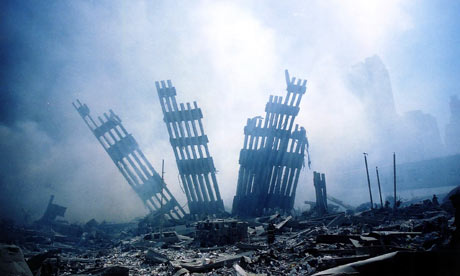 The rubble of the World Trade Center smoulders after the 9/11 terrorist attack. A military tribunal or indefinite detention of the criminal conspirators serves neither justice nor the memory of the victims of the attack, argues HRW director Kenneth Roth.
The rubble of the World Trade Center smoulders after the 9/11 terrorist attack. A military tribunal or indefinite detention of the criminal conspirators serves neither justice nor the memory of the victims of the attack, argues HRW director Kenneth Roth.The Guardian:
As the Obama administration contemplates where to try the self-confessed 9/11 mastermind Khalid Sheikh Mohammed and his co-defendants, there could be no better way to repudiate the unlawful counter-terrorism policies of the Bush administration than to hold these trials in New York federal court.
New York is where the crime took place and where the majority of the victims lived. The victims' families have a right to witness these trials and to support firsthand the US government's efforts to hold accountable those accused of this mass murder. And by choosing a federal court over the discredited military commissions, the US would show that it values the rule of law, trying even those accused of the worst crimes in a system that is broadly recognised as fair.
Any verdict by the military commissions will inevitably be tainted by the stigma of Guantánamo, where they are held. As would be expected from a tribunal created from scratch, proceedings there have been marred by endless irregularities, inconsistent application of the rules of evidence, inadequate defense resources, poor translation and lack of public access. As a result, any verdict by the military commissions is extremely vulnerable to appellate challenges – and would delay the finality of justice for the victims for years to come.
Further, justice at Guantánamo has proceeded at a snail's pace compared with trials in federal court. During the nine years since the military commissions were first announced, military prosecutors have completed only five cases, three by plea bargain. Most of these prosecutions have been of low-level offenders – cooks, drivers and even one former child soldier captured when he was only 15.
Federal courts, by contrast, have prosecuted hundreds of terrorism-related offences during the same period, including the 9/11 conspirator Zacarias Moussaoui, the convicted "shoe bomber" Richard Reid, and four defendants in the 1998 US embassy bombings in Tanzania and Kenya, which killed 224 people and injured hundreds more.
Continue reading here.
No comments:
Post a Comment
Note: Only a member of this blog may post a comment.